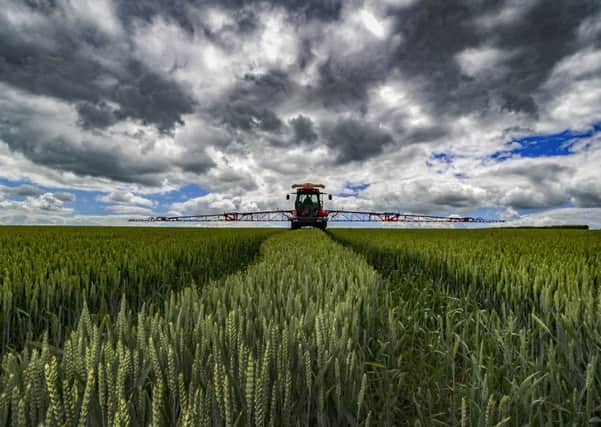Farming finds lack of political direction disturbing


The National Farmers’ Union (NFU) has repeatedly called for assurances that the food supply chain will continue to enjoy access to a competent and reliable workforce.
It has also endorsed a Parliamentary watchdog committee’s report which warned a labour crisis loomed unless urgent measures are not taken to fill gaps in the labour supply that have started to emerge, and threaten to worsen, since the EU referendum outcome last June.
Advertisement
Hide AdAdvertisement
Hide AdMeanwhile, earlier this week, a separate report published by peers warned that a transitional trade deal between Britain and the EU bloc as the two untwine is vital to avoiding a “cliff edge” for farmers.
Despite all the warnings, industry officials feel they have had too little detail from government about what deal it will attempt to secure for food and farming in its negotiations with the European Commission.
Meurig Raymond, the NFU’s president, said: “During the negotiations over a new framework for UK’s trading relations, we are calling on the government to adopt an approach that will ensure stability and continuity. This includes continued access to the EU single market, unfettered by tariffs or non-tariff barriers.
“We cannot operate in isolation. Growers rely on imported goods and inputs, particularly seed, rootstock and machinery to name a few. They have business interests in other parts of Europe and across the world and they need access to other markets for their products.
Advertisement
Hide AdAdvertisement
Hide Ad“As it stands, the NFU and its members are rightly very concerned about the present lack of clarity on the government’s approach to agriculture post-Brexit.”
Speaking at The UK Fruit & Vegetable Congress 2017 in Sutton Coldfield on Thursday, Mr Raymond said Brexit presents farming with “a golden opportunity” to shape and create a bespoke agricultural policy.
He vowed that the union would work to ensure all British political parties fully understand and engage with the food and farming community on the issues facing the sector, both now and post-Brexit, between now and the General Election on June 8.
Both the NFU and the Country Land and Business Association (CLA) welcomed the report this week from the House of Lords EU and Energy Sub-Committee which explored both the challenges and opportunities posed by Brexit for UK agriculture.
Advertisement
Hide AdAdvertisement
Hide AdThe sub-committee, chaired by Lord Teverson before the dissolution of Parliament, reported that post-Brexit life “will not be easy” for many farmers who rely on support from the Common Agricultural Policy, but that leaving the EU was a chance to move away from the EU’s “one-size-fits-all” agricultural policies.
Mr Raymond said: “The NFU is pleased to see the House of Lords report recognise several areas of concern facing agriculture, which the NFU highlighted in its evidence to the committee, as we prepare to leave the EU.
“As one of the sectors most affected by Brexit, the importance of agriculture in future trade deals must not be understated and it is pleasing to see that the committee notes agriculture cannot be seen in isolation from trade negotiations.”
He added: “The NFU continues to call for clarity from government regarding its plans for the sector in the future, and the report rightly notes that government is sending mixed messages.”
Advertisement
Hide AdAdvertisement
Hide AdThe CLA this week set out its five priorities for government in the run up to the General Election, including the delivery of a Brexit that works for the countryside.
Tim Breitmeyer, the CLA’s deputy president, endorsed the Lords report, saying: “The CLA has called for an urgent review of the need for seasonal agricultural workers, and we are pleased that the Lords support us on this. We would call on the Government to make this a priority when they return to their desks in June.
“Brexit also presents many opportunities for agriculture, including creating a replacement for the Common Agricultural Policy (CAP). We are pleased that the Lords support our call for the design of a fully funded policy to replace CAP, that ensures a more resilient productive sector going forward, and we believe this should be a priority for whatever government emerges from the general election in June.”
Mr Breitmeyer concluded: “Peers have set out that they believe that securing a good deal for agriculture must be a government negotiating priority. The CLA has put forward the red lines it believes Government must not cross when negotiating a trade deal with the EU and we will continue to press for these in the crucial months ahead.”